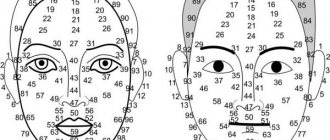Author of the material:
Inna Trofimova
writer, psychologist, gestalt therapist
A bad character makes being in a person’s company uncomfortable and uncomfortable. There is anxiety and tension around him. He doesn't like people, he treats them arrogantly and servilely. Almost never compromises; he can change his opinion, behavior, or decision without any reason. Stubborn, loves to dominate, but does not take responsibility. After communicating with such a person, you feel tired and internally empty. There are other signs by which you can recognize people with complex dispositions.
Passive aggression
One of the worst characters is the passive-aggressive one. Such a person is a real test in life. He will never say openly what the reason for his anger is, as if others should read his thoughts. The main feature of such a person is suppressed anger - it is this that in most cases is the cause of bad character. Psychology has long been studying such people.
But you don’t need to be a genius to understand: the aggressor is full of anger and resentment, but often he is unable or does not have the desire to correctly express his emotions. Instead, he will slam the door, “forget” about work deadlines, and “not have time” to meet someone else from the airport. Passive aggressors are born manipulators. Their favorite phrase is “Do as you please”; and my favorite psychological “buttons” are pity and guilt. For a passive aggressor, expressing your desires directly is unrealistic. However, just like refusing another, saying “no”.
Signs of people with mental disorders
To understand that bad character is a sign of a mental disorder, you need to pay attention to symptoms such as frequent hysterics, panic attacks, psychosomatic reactions - rapid breathing, accelerated heartbeat, confused, uneven heart rhythm. A person with such manifestations needs consultation with a neurologist and medical care.
Memory deterioration and decreased learning ability are signals indicating disturbances in brain function. Persistent neurosis in adults develops against the background of frequent stress, workaholism, unrequited love, a fast pace of life, and numerous vital problems. No one is immune from such situations and the resulting mental disorders.
This is bad news. The good thing is that this is the case when bad character can be corrected. After treatment of a mental disorder, negative traits are leveled, disappear, and eliminate themselves. A person changes for the better, becomes adequate, calm, balanced, and friendly.
“Punishment” of others with passivity
Passive aggression can also manifest itself in the form of silence. A harmful person, which is a passive aggressor, gets angry inside himself and does not say anything to a friend or relative. He suffers silently and “heroically.” In psychology, it is believed that passive aggression can also manifest itself in relation to oneself. For example, a mother is angry that her teenage daughter came home not at 10, but at midnight. However, since she does not want to show anger openly, provoking a conflict, her emotions turn towards the destruction of her health. The mother may become ill, such as have a heart attack. Thus, the daughter will be “punished.” It is unlikely that after this she will have enough conscience not to come home on time.
There are other types of passive aggression of this kind. The wife, offended by her husband for some unknown reason, goes to sleep on the floor. The husband, having listened to the scandalous claims, goes out onto the balcony in winter without clothes. A mother who asks her children to help and is told no, says she will do the garden work herself - and then breaks her back. This kind of behavior is actually demonstrated by people with the worst character. It would seem that such behavior is driven by the best motives. But in reality, a person is full of resentment, aggression and the desire to punish another.
Psychopaths
This is truly the worst character. A psychopath does not feel other people's pain. He has practically no fear of anything. At times he may seem completely emotionless. As children, such people torture animals. A relative or spouse of a psychopath may constantly fear that every fight with this person will be their last. Such a person turns any situation to his advantage - so that others feel guilty. If someone from his circle makes a mistake, this is a tragedy of universal proportions. If he makes a mistake, it’s a small thing that you shouldn’t even think about.
To those people who do not like him, a psychopath will always attribute the worst character and a couple of psychiatric diagnoses to boot. All his enemies are “crazy”, “alcoholics”, “idlers”. This alone, the psychopath is convinced, is the reason why these people dislike him and avoid him at all costs.
Causes of bad character.
Each of the needs listed below is not bad in itself. But in an exaggerated form it leaves a negative imprint on the character.
The need to have a strong partner nearby.
A person refuses to take responsibility and seeks to shift it onto someone else’s shoulders. To do this, he chooses a husband, wife, parents, colleagues, friends. At first, the “helper” may not understand that he is being used; while he supports, helps, and takes responsibility, a manipulator with a bad character will try on the role of a victim. This will be expressed in the following scenarios:
- I can’t find a job, that’s why I’m not looking;
- everyone around me does not understand, so I will conflict with everyone;
- I don’t know how to cook (clean, earn money, etc.), so do it for me.
The need to dominate others.
It is expressed in the need to dominate everyone, to control other people’s actions. A person strives to subjugate not only people, but also situations, and therefore always strives to take everything into his own hands. He will do everything himself, since he does not trust others, he will double-check everything. Afraid of everything he cannot control. Uncertainty is his greatest discomfort. Spontaneity is not inherent in him. He has contempt for weak people.
Take a character test
The need to use and manipulate others.
A person with a difficult character may perceive others as a means to achieve his own goals. He is not interested in the problems of others; if they refuse to help him or do not agree with him, he takes it with hostility, sometimes sincerely does not understand why they refuse to indulge him. He has the art of manipulation. If no benefit is received, the time spent with the person is considered wasted.
The need for constant approval.
Do you want to make better decisions, find your ideal career, realize your maximum potential and receive instructions for individual development?
?
All this can be done using the Human Design
. Build your map and get basic decryptions for free.
A person needs to have his actions approved; it is important for him to please everyone. If someone is dissatisfied with him, he will feel awkward. Praise is more important than profit. A person can act to his own detriment just to hear pleasant words addressed to him. He plays the role of a savior, he is often manipulated, but he refuses to admit it, believing that he is needed and he is doing a good deed. But if praise does not come, first the person turns into a victim, beginning to feel sorry for himself, and then into an accuser, making claims.
The reason for this behavior lies in low self-esteem. They can become depressed from hostility towards themselves. They tend to suppress feelings and often live the way others want, without understanding their own desires.
The need for self-admiration, narcissism.
No one likes such people except themselves. They create a certain fictional image in their head according to which they are ideal. These people are narcissistic, wear a mask behind which there is nothing significant. Self-esteem is inflated. Narcissists admire themselves and constantly extol their actions, love to brag, and exaggerate their importance. They are egocentric, the world should revolve around them, if you don’t agree with them, you can immediately fall into the category of enemies.
The need to be the best.
Man is constantly striving to be better than others. He tries to be perfect in everything from small things to big things. This is the image of a head girl who studies better than anyone, tries to please all the teachers in order to be praised, and at the same time belittles the merits of others in order to look brighter against their background. Often we are not talking about real achievements, but about fictitious or inflated ones.
The biggest fear is failure. Even the smallest loss is perceived painfully. Most often, such people are workaholics, using work to polish their perfection. They do not take criticism at all; it unsettles them. Vengeance awakens in them, a desire to humiliate others in order to regain leadership.
The need for prestige.
Such people are dependent on how they look in the eyes of others. They strive to appear successful, but this is not always true. They are characterized by snobbery. They are fans of brands, such people will spend their last money on a new iPhone model and at the same time eat short shirak. They communicate only with the “chosen ones”, whom they consider important for emphasizing their status. They treat interlocutors whose status is lower than theirs with high regard. They often suffer from self-mania and are addicted to social networks.
The need to be "invisible".
These people avoid life and are content with little. Any change for them is associated with leaving their comfort zone. They don't believe they can improve anything in their lives. Self-doubt is so developed that a person cannot even admit that he has resources for development, but he is simply afraid to fulfill his desires. On the one hand, it’s calm with them, they don’t stick out their “I”. But such a person will not go out into society, he will hinder the development of a friend or significant other, stubbornly refuses any innovations, and it is difficult to convince him.
Take the self-doubt test
Impudence
Often people with the worst character are insolent. Such a person is a real impudent and shameless person. He is not embarrassed by his rudeness. Rather, on the contrary, an insolent person will feel at his best if he pisses off another person. In some cases, assertiveness can have a positive connotation - if the emphasis is on self-confidence. However, not in the case of an insolent person with the worst character, who is distinguished by complete impudence.
Such people can “test” their self-worth by humiliating other people. He shows impudence precisely in order to once again assert himself, to prove to himself that he means something. Sometimes such people deliberately provoke a scandal. Even if their victim tries to maintain composure at first, they ultimately still achieve their dastardly goal.
How to determine bad character by a person's appearance
To learn to understand an individual’s character traits by appearance, you need to be attentive to little things and details. The principles of physiognomy will help to identify the negative character traits of a new acquaintance without entering into a conversation with him.
Having mastered the skills of physiognomy, you can predict the behavior of a stranger and protect yourself from possible unpleasant contacts. Advice from experts in this field boils down to careful contemplation of the face and other parts of the body of your interlocutor. The meaning of characteristic features:
- Short neck. Indicates the owner's stubbornness and short-sightedness.
- Wide, massive hips. They give away an unyielding, stubborn person.
- Narrow forehead. Indicates a quick-tempered nature.
- Thin eyebrows. They emphasize arrogance, selfishness, arrogance, and ambition.
- Fused eyebrows. A sign of rudeness, cruelty and power.
- Deep-set eyes. Indicate the greed and envy of the owner.
- Narrow eyes. They hand over the aggressor and usurper.
- Sharp, elongated nose. Indicates a person's temper.
- Upturned, snub nose. Emphasizes the frivolity and capriciousness of the individual.
- Wide, thick nose. A sign of rude behavior.
- Narrow mouth. Emphasizes the secrecy of nature.
- Protruding lower lip. It indicates the unscrupulousness of an individual who is ready to do any unseemly acts in order to achieve a goal.
You should not draw categorical conclusions based solely on a person’s external data. It is better to take the characteristic signs of negative traits as a guide and try to find out how much the appearance characteristic of a certain psychotype corresponds to the internal content of a particular person.
Examples of bad and good character in literature
In literature, one can name many examples of negative characters with negative character traits. For example, this is the old money-lender from Dostoevsky’s novel Crime and Punishment. She profits from someone else's misfortune and abuses her unfortunate sister. Also, as an example of a harmful person, one can name the lady from Turgenev’s “Mumu”. She controls the destinies of people at will, without the slightest compassion. An opposite, positive example of a literary character can be the heroine from Ostrovsky’s play “The Thunderstorm” - Katerina. The main character traits of the heroine are tenderness, honesty, adherence to principles, religiosity, and poetry. The heroine is not able to live by the values by which other residents of Kalinov live. And therefore her life becomes completely unbearable. The main character traits of Katerina are positive; she is a kind person. Because of this, the heroine suffers. However, since her nature is still strong, Katerina persistently fights against the “dark kingdom.”
Definition
A bad character is a set of such properties, among which negative ones predominate, which affects the behavioral characteristics of the individual. Negative qualities are found in the character of any individual. Normally, they are weakly expressed, appear briefly, quickly giving way to positive features. A pathological deviation is considered to be cases when negative character traits are exaggerated, which leads to such excesses in behavior:
- The need to dominate and manipulate others.
- The need for constant approval and admiration, narcissism.
- An urgent need for a sense of self-worth.
A bad character means that its owner ignores the requests of others, does not take into account their wishes and opinions, is vindictive, and behaves provocatively. Psychotypes of individuals with a predominance of negative properties:
- Aggressive. Characterized by hostility, cruelty, a tendency to conflict, and increased demands.
- Exploiting. Shows a desire to constantly evaluate and criticize the actions of others, is characterized by obsession and a desire to suppress initiative that does not come from him. Prefers to use others to achieve his goals.
- Avoidant of reality. Tries to distance himself from any problems, avoids responsibility, is secretive, cautious, and distrustful.
Bad character is a set of qualities that force an individual and his environment to deal with misunderstanding and hostility on a daily basis, which complicates communication in his personal life and interferes with the performance of official duties at work. Such a review of an individual is appropriate in cases where his behavior does not correspond to generally accepted norms and causes mental, moral and physical suffering to others.
Intractability, authority, and stubbornness provoke a surge of negative emotions in any interlocutor. Moreover, the owner of a bad character himself suffers from his behavior no less than those around him. His internal state is deprived of stability and harmony, he is not given the opportunity to experience happiness, he is constantly haunted by a feeling of internal dissatisfaction and dissatisfaction with reality.










